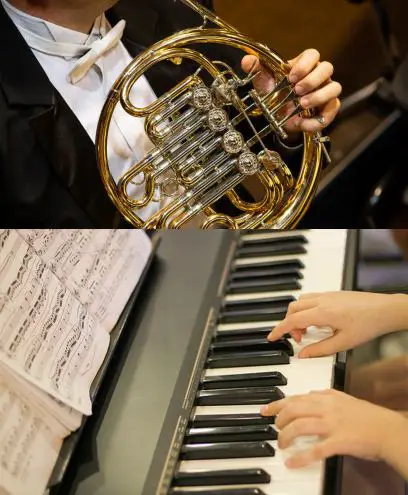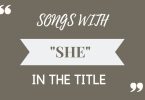Which is harder- Piano or the French horn?
It’s difficult to compare the difficulty of the two instruments. The piano and the French horn each have their own unique set of difficulties:
On the piano,
To play the piano well, you need to be able to use both hands at the same time. What about your toes, though? Also, keep in mind that you’ll be using a minimum of two foot pedals at the same time. This is when your muscle memory will finally take over. It’s not as simple as you might seem to keep track of all the notes on two different clefs, with two hands, and a choice of 88 keys on the instrument.
Practicing difficult pieces like Rachmaninoff’s concertos, Chopin’s ballades, and Liszt’s Etudes on the piano presents a number of hurdles, including:
- The ability to play fast extremely quick passages using advanced finger techniques.
- Using one hand to play up to ten notes apart,
- The ability to play varied dynamics and tones on different keys at the same time using finger control.
- The ability to read vertical chords of up to 10 notes.
On the French horn,
- The notes are closer together:
Because the French Horn is further up the harmonic series than many other instruments, the notes on the French Horn are significantly closer together. That being the case, what does it signify for the French horn player? It means that a dedicated French Horn player must work hard to develop a well-trained ear, which requires time and patience.
The French Horn is less forgiving than other instruments because of its higher pitch and closer notes. Make a mistake, and it’ll be beyond recognizable and probably rather cringe-worthy.
Which is more expensive – Piano or French horn
In terms of cost, whether you buy it brand-new or old, the piano is one of the most expensive instruments you can buy. Even renting is pricey when compared to other band instruments, with entry-level models ranging from $65 to $120.
The average price of an upright piano is between $3000 and $5000. Higher-quality uprights might cost up to $10,000. A grand piano is a good option for advanced players, but they start at roughly $15,000.
Then there’s Steinway, which is unquestionably the pinnacle of the industry in my opinion. In today’s market, a 7-foot Steinway B costs well over $120,000! Due to this reason, I recommend that students begin their musical journey with a less expensive yet functional instrument.
The Yamaha DGX-660 is a fantastic piano with a weighted action that closely resembles that of an acoustic instrument. It also contains a built-in metronome and other kinds of music to keep things interesting.
The Yamaha YHR-314II Student F French Horn
Lower price point than pianos, which makes them a good option for new students. Violins, like pianos, come in a variety of price ranges to suit a wide range of players. Beginner French horns can cost anywhere from $1,200 to $3,500.
Between $3,500 and $4,500 is the price range for intermediate and professional-level models. You should only buy a French horn from a recognized company that offers high-quality instruments.
The expense of private music lessons is another consideration when purchasing a piano. While learning to play the French horn, many students are needed to take additional music courses.
Which is more Portable Piano or French horn
French horns Are More Portable
You’ll need to stay in one place all the time to practice your craft on a piano because they aren’t very portable. Even if you travel extensively, there are numerous obstacles to overcome in order to get a solid practice session in.
You can take a French horn on a plane, a car trip, or even to the park for a picnic. A detachable bell is available on some step-up French horns to make them more portable. It’s crucial for a learner to have an instrument that they can always use.
Which is more fragile – French horn or Piano
French horns Are More Fragile Compared To Piano
To play the French horn, young musicians must be extremely cautious. The French horn is much more delicate than the piano. It’s a considerably smaller instrument with a lot of fragile parts exposed. There are a number of issues that can arise simply by dropping the French horn.
When teaching young children to play the French horn, you should always advise them to keep their instrument in a protected case. It’s not uncommon for a student who’s just beginning to learn how to use the chin rest and good posture to drop it mistakenly. Kids will be kids, and as a result, they may be a little careless with their instruments from time to time.
However, a piano is much more resistant to breakage. At the most, a few scuffs to the casing and finish could be caused by carelessness. Despite minor dings, scratches, and scuffs, many of the pianos I’ve seen play beautifully.
To keep the instrument in good condition, use a thick piano cover to avoid scratches and chipping. There are also keyboard covers that you may use to keep the dust away.
It’s not an instrument you’ll be moving about much, and you’ll always have a dedicated practice room for it. When it comes to humidity, pianos can have certain mechanical and tuning concerns. As long as you keep the house at a comfortable temperature, it should last.
Which is harder – Piano or French horn
The Piano Has a More Difficult Learning Curve
The French horn is far more difficult to learn than the piano when it comes to getting started, it has the widest range of any brass instrument: it can go almost as high as a trumpet and as low as a tuba. An embouchure must be developed because the horn’s mouthpiece is so small and deep. Playing with a mouthpiece that is both long and thin is a greater challenge.
The ability to quickly switch places while maintaining a good tone will take some practice for new students.
The piano, on the other hand, eliminates a lot of the guessing. Because they’re pre-tuned, students can pick them up and begin playing right away. To get it in tune, all you have to do is call a professional. On the piano, it is also much simpler to figure out where the notes are.
For every full and half step, the octaves have a distinct pattern When it comes to piano vs French horn, you could have a student playing many pieces on day one.
Establishing optimum bench height, good posture, and finger placement are undoubtedly difficult tasks when learning to play the piano. The good news is that it’s an instrument that can be learned one hand at a time and yet provide excellent results.
If you want to progress as a pianist, you’ll need to have good dexterity in both hands. The good news is that you can really focus in on such skills with easy repertoire in the early stages of learning.
Which is easier to maintain – Piano or French horn
Pianos have a Low Maintenance Need
The piano is one of my favorite instruments because it requires very little maintenance. Simply maintain the temperature regulated, make sure it’s covered, and tune it twice a year. The cost of proper tuning might range from $150 to $200 every visit, which is not exorbitant. If you need anything more done to the piano, such as voicing and key lubrication, expect to pay a little more. It’s unlikely that any piano will ever need a substantial repair. This involves the replacement of hammers, cosmetic repairs and rebuilding the action.
Over time, it appears that maintaining a French horn costs a little more. French horns are extremely delicate, and breaking one nearly always necessitates a new purchase. Repair prices are affected by a variety of factors, including the type of instrument level. Repairs on student models can cost between $60 and $70, while those on professional models might cost more than $100. Cracks, on the other hand, can cost upwards of $250.
Some French horn bells cost as much as $1700 to repair, depending on the amount of the damage. There is a higher cost of labor and experience because it is a more difficult instrument to operate with than a piano.
Which is easier to begin with?
The French horn’s learning curve is steeper than the piano’s at first. Piano beginners can usually play notes and simple melodies within a few hours, whereas French horn players typically require weeks to achieve an acceptable sound.
Is it easy to switch from playing the French horn to playing the piano?
The good news is that you can probably read music if you can play the French horn. One note at a time, that’s all that matters. And you don’t have to blow into a piano to make it sound. However, these are two completely unrelated instruments
The ears of French horn players are usually very trained. For example, this will assist you find the proper keys, even if you have completely different ideas about how to use each instrument’s keys.
Playing the piano necessitates an entirely distinct set of skills, as you must use both hands and your foot on sometimes (for the pedals). Hand dexterity is far different from that of the French horn. Right and left hands are going to perform quite distinct functions (and it really helps to be right-handed). You’ll be reading a whole handful of notes, not just one line.
Anyone who has mastered the art of playing an instrument already has a solid foundation in musical theory and notation. This will make learning easier for you (but not with actual playing).
To see if you have a natural knack for it, you should take a few classes. If you’re having fun, keep doing it. A piano is required for practice, renting one is an option if you don’t want to buy one right away.
French horn or piano: posture
Piano playing requires a similar posture to sitting in a chair. Adjust the piano stool’s height so that you can play with your elbows bent at 90 degrees and your hands on the keys straight.
Even though you will employ additional body-movement such as leaning forward and laterally as you develop, the basic seated position will remain the same.
New French Horn players must also pay attention to their posture. French horn posture is very different from piano posture. In addition to the way you handle the instrument, you may also pick up new techniques as you progress. Horn players can adjust the pitch of the tone by putting their hand in the bell of the horn and employing the technique known as “hand stopping,” depending on how they shape their hand.
Stand-up practice is recommended by some players because it seems to make deep breathing a little easier because the body is less constrained.
Conclusion
As you can see, both instruments have their advantages and disadvantages. I firmly believe that the piano is a better instrument It’s a lot of fun to play, and I like how it opens up a wider range of possibilities when it comes to creativity.
While it is more expensive than a French horn, the long-term maintenance costs will be lower. If you invest in a piano like a Yamaha or Steinway, you can expect it to last for many years.
The French horn, nevertheless, remains a fantastic instrument. If you like the French horn, that’s also fantastic! The learning curve is steep at first, but once you’ve perfected your skills through practice and concentration, you’ll have a lot of fun playing.
It’s great that French horn has so many options for playing in an ensemble. Students will need that if they want to be as innovative as possible. In addition, the instrument’s portability makes it an appealing option.







